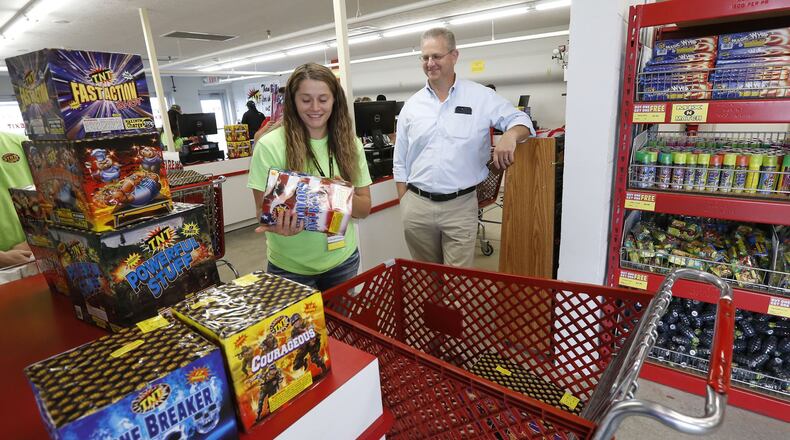Williams’ group advocates for stricter fireworks laws. The Ohio Fireworks Safety Coalition held a briefing Tuesday with the Ohio state fire marshal’s staff.
“Unfortunately, more and more states are going the route of legalization with dire consequences,” Williams said. She alleged that after Iowa dropped its ban on consumer use of 1.4G fireworks, the state saw injuries increase 152% and a drop in public support for legalization.
Before 1983, Ohio banned purchase, possession and discharge of fireworks. The law changed to allow the purchase if buyers promised to take the fireworks out of state.
MORE: Ohio considers major changes to fireworks laws
Earlier this year, a Phantom Fireworks official told the Dayton Daily News the Youngstown-based company believes Ohio’s fireworks law makes “criminals out of Ohioans for celebrating our nation’s independence.”
Every state bordering Ohio allows for some type of consumer-level fireworks, said Dan Peart, the company’s government affairs director.
House Bill 253 and Senate Bill 72, both pending in the Ohio Legislature, would lift the ban on consumers discharging such consumer fireworks. The bills would legalize “backyard” fireworks on private property year-round unless local governments pass restrictions.
At present, a resident 18 or older can purchase fireworks from a licensed dealer in Ohio, but they are prohibited from setting them off in the state unless they are a licensed exhibitor of fireworks, Ohio Attorney General Dave Yost said.
“In small towns and large cities alike, fireworks will light up Ohio nights throughout the week,” Yost said. “Just make sure your own backyard isn’t ground zero for those red, white and blue pyrotechnics.”
Based on what Ohioans hear in their neighborhoods during the 4th of July, plenty of people are violating the current law. That could be a first degree misdemeanor with a $1,000 fine and up to six months in jail, but it rarely is enforced.
“It’s up to the consumer to know those laws,” said David Butler, manager of TNT Fireworks Supercenter, a chain store that sells Roman candles, rockets and sparklers at 840 S. Union Road.
“You always want to use fireworks under adult supervision,” Butler said. “All the fireworks have a safety label on them. You want to follow that and use the instructions on the package. You want to have a water source available, like a bucket of water, to have handy in case you need it. Those are probably the biggest things.”
Fireworks triggered a catastrophic car explosion last Fourth of July in Dayton, police and fire officials said at the time. The explosion injured a man who was pulled from the burning car and caused minor injuries to several people outside. A witness told the Dayton Daily News the explosion sounded like a bomb and blew off the vehicle’s skylight, hitting the witness’ vehicle and setting off his car’s airbags.
A 61-year-old Toledo man was killed Tuesday morning after shooting off fireworks there, reported The Blade of Toledo. The man, who was pronounced dead on the scene, had put on a fireworks display for the neighborhood when the display tipped over and struck him in the chest.
“It was a very preventable accident,” said Pvt. Sterling Rahe, a spokesman for the Toledo Fire & Rescue Department.
RELATED: Boy who lost hand in Oxford explosion ‘has a good attitude after what happened’
In Oxford this March, two boys ages 8 and 12 were injured when they lit a broken end of a rocket. One boy lost a hand and some teeth. The incident resulted in the recall of 250,000 units from Grandma’s Fireworks of Indiana after Oxford police involved the federal Bureau of Alcohol, Tobacco, Firearms and Explosives and the U.S. Consumer Product Safety Commission.
The commission’s 2018 Fireworks Annual Report says 9,100 people were treated in emergency departments for fireworks-related injuries. About 60% of those occurred in the month before and after Independence Day, the report says. About 36% of those injured were children younger than 15.
The same report in 2017 reported 12,900 people were treated in emergency rooms. Williams attributed the drop between 2017 and 2018 to temporary bans on fireworks put into place in western states experiencing droughts.
Staff Writers Patrick Keck and Lauren Pack contributed reporting.

